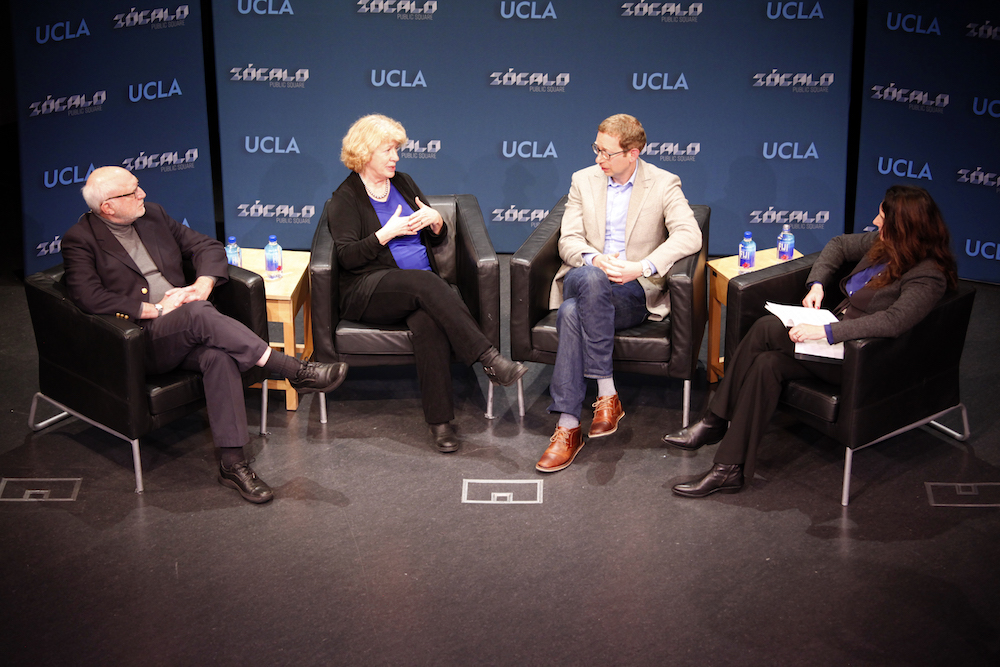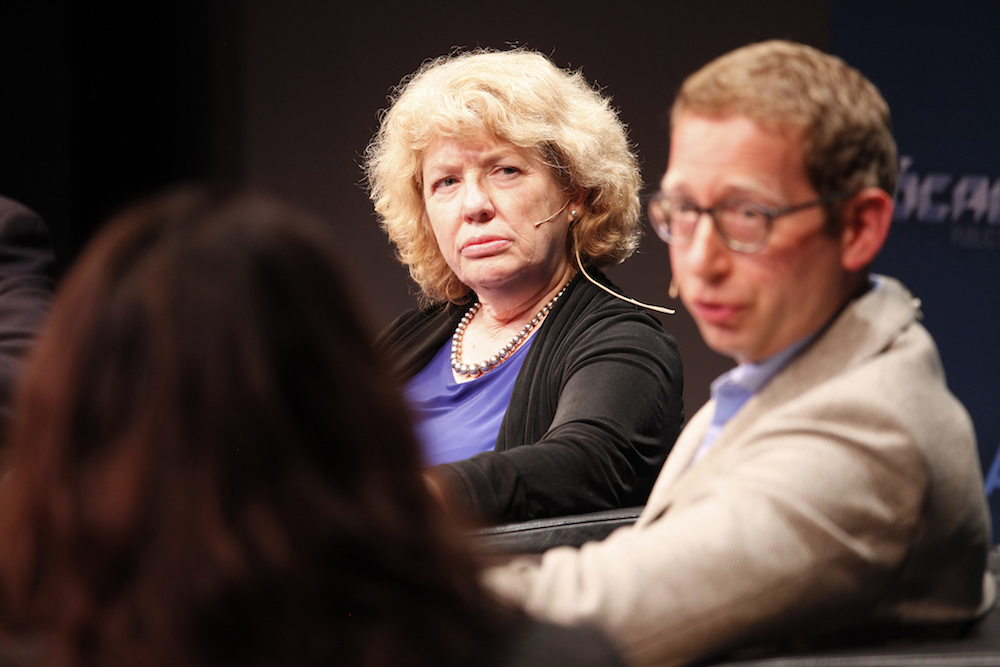
Photo by Aaron Salcido.
Can a sitting president be indicted? Can a president pardon himself? These were just some of the questions UCLA constitutional law scholar Jon D. Michaels, Wake Forest political scientist Katy Harriger, and Joel D. Aberbach, political scientist and former director of the UCLA Center for American Politics and Public Policy, contemplated on a rainy night in downtown Los Angeles at the National Center for the Preservation of Democracy. Before an overflow crowd, Madeleine Brand, host of KCRW’s “Press Play,” moderated the Zócalo Public Square/UCLA Downtown event titled “Are American Presidents Above the Law”?
To get the conversation started, Brand asked the panelists to offer their predictions on what the Mueller report may eventually reveal when it is released. By and large, the panelists offered a sobering take, based as much on current political realities as the report’s possible content. Michaels said he would like everyone to calibrate their expectations, and that the report, when it is finally issued, could be simply a summary of what’s already been discussed. There’s “a good chance that we won’t be shocked by anything,” Michaels said, because “we’ve been constantly bombarded with scandal after scandal.”
Aberbach also echoed this concern, adding that even if the report showed wrongdoing, the political circumstances that worked during Watergate—in particular the fact that Gerald Ford (who replaced Spiro Agnew) was widely respected by both parties—do not exist with Vice President Pence.
Harriger said that “it’s clear already without Mueller’s Report,” just based on the indictments and what’s been discovered elsewhere, that the Russians were trying to interfere with the election. Whether there’s enough evidence to prosecute a crime, she said, is a different question than whether bad things happened. She cautioned that because we are so focused on getting “the big fish”—in this case President Donald Trump—that we “may be missing the bigger picture.”
One of the key points of Mueller’s investigation is assumed to be Donald Trump’s possible obstruction of justice after he fired former FBI Director James Comey. Harriger explained that there are three elements that have to be proven in an obstruction of justice case. There needs to be a guilty act; in this case Trump’s firing of Comey would suffice. There also must be a “corrupt purpose,” and this aspect, Harriger believes, could be difficult to prove. The final element is that the act must interrupt or attempt to interrupt a proceeding of some sort, and Trump’s firing of Comey could very well have been an attempt to derail the FBI’s Russia investigation.
What about any of the explosive things Trump has said on the record—like his infamous interview with NBC’s Lester Holt in which he said that he, at least in part, fired Comey because of the Russia investigation? Do any of these statements help bolster the obstruction of justice case? “I don’t think that’s enough,” Harriger said, explaining that there has to be evidence from other people.
If there is, for example, evidence that the Trump campaign knew the Russians had hacked the emails of the Clinton campaign days before Trump’s public statement at campaign rally in which he invited the Russians to hack into Clinton’s emails, then that public statement could be used to help build a case. However, because Trump has often contradicted himself and made numerous inflammatory statements, it’s difficult to pinpoint exactly what he’s said and when. “It’s an irony,” said Aberbach, “that his bad reputation in many ways is a strength in this particular setting rather than a weakness.”
The way the Trump administration has turned both cultural and legal precedents on their heads, the panelists agreed, complicates the legal picture. While the Mueller investigation has already led to numerous indictments for those who served on Trump’s campaign and his administration, the question of whether the President could also be indicted remains unresolved. While the Justice Department has maintained that a sitting president cannot be indicted, or can only be indicted after impeachment, that interpretation of language in the Constitution, Michaels explained, “is not [obtained] in a court of law … but it was an independent judicial determination.” Considering this, it’s likely the Department of Justice will point to the long-standing legal practice observed by previous administrations that we don’t indict a sitting president, but “that doesn’t necessarily mean it’s the last word,” he said.
With talk of impeachment mounting, Aberbach expects that there will at least an attempt at impeachment—as the Democratic leadership in the House has signaled. However, he warned that impeachment could actually further rally Trump’s supporters, in the way that President Bill Clinton’s support grew after his impeachment. The panelists agreed that the decision on whether or not to move forward on impeachment in the House will be made on political grounds, as Democrats will have to consider if impeachment will actually strengthen the president’s base.
If Trump is indeed impeached—something that the panel thinks is unlikely given that it would require a vote from two-thirds of the Republican-dominated Senate—would he be able to pardon himself? This is yet another legal question with no precedent, and Michaels cautioned that if Trump were to pardon himself, it would be litigated potentially for the remainder of his natural life.
The panelists found the current state of the courts—a branch of government that offers an important check to executive power—particularly troubling, as they have become more and more divided along party lines. Trump has now appointed two Supreme Court justices as well as numerous judges in the lower courts. Michaels said this moment is so disconcerting because “the nomination and confirmation process has become so political.” Judges are now labeled “Obama judges” or “Clinton judges” if they issue opinions that strike down Trump’s executive orders, like his so-called “Muslim ban.” And what does it mean for the future of the Supreme Court, Harriger asked, if Trump continues to talk of “his court?” With the increase in the number of conservative judges appointed to the Supreme Court who seem to favor an increase in executive power, there is a chance that executive power will be allowed to grow further.
Ultimately, there are no easy answers to the many complex legal questions swirling around Mueller’s investigation into the Trump campaign and administration. However, this lack of tidy answers could be seen in a hopeful light. The questions contemplated over the course of the evening introduced “an essential dilemma,” of our time, Aberbach said. The checks and balances and intricacies of shared power that strengthen our political system, he explained, rest on “an assumption … that there is a certain set of norms that the [politicians] are supposed to follow.” And perhaps the most disconcerting thing about Trump’s time in office is that “he has violated many of these norms in a way that no one else has,” he said.
When the conversation turned to the 25th Amendment, which makes provisions for shifting power when the president is incapacitated, the panel joked that they had “more bad news.” The process of removing a president is, by design, extremely difficult.
To sum up, Brand said, the answer to the three questions posed by the discussion—impeachment, indictment, and the 25th Amendment—are: “No. No. And no.”
In the end, the panelists put their faith in the power of the ballot box. They stressed during the question-and-answer session that by voting for candidates—whether they be running for president or a seat in the House or Senate—who declare a commitment to the checks and balances built into our constitution, voters can help restore faith in democracy.





Send A Letter To the Editors